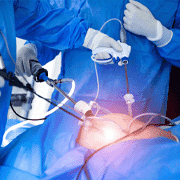Can Kidney Stones Be Treated with Laparoscopy - Ultimate Guide
In This Article
Can Kidney Stones Be Treated with Laparoscopy - Ultimate Guide
Sidharth
Updated on December 12, 2023
Medically verified by Dr. Arya
Fact checked by Dr. Sharon

Laparoscopic
10 min read
Are you suffering from kidney stones? Have you ever wondered what the deal is with them? If you check with an expert, you will realize that the best way of getting rid of kidney stones is surgery.
Sounds scary? Not at all.
With Mykare Health’s best laparoscopic surgeons, kidney stones can now be removed in a minimally invasive way. You don’t have to go for an open surgery.
Here we are to decode how laparoscopy can flush out kidney stones. And make your life easy.
What are kidney stones?
Kidney stones, also known as Renal calculi, are solid mineral and salt formations that develop inside the kidneys. They can vary in size and may cause pain and discomfort when they pass through the urinary tract. They can bring on some serious pain – we're talking excruciating pain!
Now, don't think you're alone in this struggle. Kidney stones are actually a pretty common issue worldwide, affecting millions of people. You can overcome them easily if you know certain things about them. Like:
-
These little pebble-like deposits come in all shapes and sizes. Ranging from tiny grains to larger stones that can clog up your ureter or kidney.
-
The four most common types are calcium stones, uric acid stones, struvite stones, and cystine stones. Keep an eye out for them!
Prevalence and common symptoms
Kidney stones are on the rise worldwide, messing with lots of folks at least once in their lifetime. These stone formations in the kidneys can lead to various symptoms. Common signs include severe pain in the back or lower abdomen, discomfort during urination, cloudy or smelly urine, and frequent urges to use the restroom. Some people may experience blood in their urine as well. Recognizing these symptoms is crucial for early detection and timely management of kidney stones.
Also, if you're a man, you may be at a slightly higher risk of developing kidney stones, according to some studies. However, it's essential to remember that kidney stones can affect people of all genders, and individual risk factors vary based on lifestyle, diet, and medical history.
Regular check-ups and maintaining a healthy lifestyle can help mitigate the risk and ensure early detection if any issues arise. It also depends on where you live, what you eat, and your family genes.
You will be in a better place to start the treatment on tike if you’re aware of the signs. These are:
- Sharp pain in the back, side, lower belly, or groin
- Painful and frequent urination
- Blood in the urine
- Nausea and vomiting
- Fever and chills (indicative of an infection)
What is Laparoscopy?
Laparoscopy is a medical procedure that doctors use to look inside your body without making big cuts. Instead, they use small holes in your belly and a tiny camera to see your organs.
The camera sends pictures to a screen, and the doctor can see what's going on inside you. It's like using a special tool to see inside a small, closed space.
Laparoscopy is a safe and less painful way to find out what might be causing problems in your body. Doctors use laparoscopy to help diagnose and treat different health issues.
At Mykare Health, we offer advanced laparoscopy surgical service without the need for big incisions. Instead, we use small holes in your belly and a tiny camera to get a clear view of your organs.
Advantages of laparoscopic kidney surgery
- Smaller incisions (about the size of a dime) for the same surgeries as before.
- Reduced pain and scarring.
- Shorter hospital stay.
- Faster recovery after surgery.
- Clearer images on a screen due to the camera used, allowing doctors to observe more details inside the body compared to regular surgery.
Mykare Health will provide comprehensive support and guidance throughout your surgery, ensuring a smooth and successful experience while prioritising your well-being and recovery.
Traditional treatment methods and their limitations
The traditional methods of treating kidney stones have some drawbacks compared to laparoscopy, a newer and less invasive approach. Here are the limitations of the traditional methods:
- Large stones may not respond well to traditional treatments like medications or shock wave therapy. They may need other options.
- Some stones in tricky spots may be hard to reach using traditional methods. This, in turn, makes it challenging to treat them.
- Traditional surgeries may need longer recovery times and cause more discomfort than laparoscopy.
- Open surgeries can lead to more scarring. They also have a higher risk of complications like infections and bleeding.
- Traditional methods may not be as precise as laparoscopy.
- Patients may need to stay in the hospital longer when undergoing traditional treatments.
- Traditional methods can be more uncomfortable during the recovery period.
- There is a risk of injuring the ureter during certain traditional treatments. This injury may need more treatment.
Laparoscopy offers a better solution for many of these limitations. Providing a less painful and more accurate treatment option for kidney stones. But, the choice of treatment depends on individual factors.
Also Read : Laser treatment for kidney stones
 9 min read
9 min readTop 9 Things To Know About Laparoscopic Treatment for Pregnancy
 9 min read
9 min readHow Much Does Laparoscopy Treatment Cost? Here's The Truth
 8 min read
8 min readTreatment After Laparoscopy for Pregnancy - What You Need to Know
Book Your Consultation Now
Causes and risk factors of Kidney Stones
- Dehydration
- Dietary Factors (high salt, oxalate, or animal protein)
- Family History
- Certain Medical Conditions (hyperparathyroidism, gout, urinary tract infections)
- Obesity
- Age and Gender (men and older individuals)
- Medications (diuretics, antacids)
- Anatomical Abnormalities in the urinary tract
- Inflammatory Bowel Disease
- Low Citrate Levels in urine
- High Blood Pressure
- Excessive Vitamin D or Calcium Intake
- Surgical Procedures
- Climate and Geography (hot and dry climates)
Types of kidney stones
Calcium Stones: The most common type of kidney stone is made of calcium. It may occur to you when there is too much calcium in your urine. Calcium sticks together to form stones.
Uric Acid Stones: These kidney stones are formed when there is too much uric acid in your urine. Uric acid is a waste product that comes from the breakdown of food.
Struvite Stones: These stones form due to urinary tract infections. Bacteria in your urinary tract can change the urine's composition. This can result in formation of struvite stones.
Cystine Stones: Cystine stones are rare and happen when there is too much of a certain amino acid called cystine in your urine. This amino acid builds up and forms stones.
Each type of kidney stone can cause pain and discomfort. It's essential to drink plenty of water and follow a healthy diet to help prevent these stones from forming.
If someone has kidney stones, our doctors can help figure out what type they have and suggest the best treatment.
How kidney stones are diagnosed
When you're dealing with kidney stones, doctors diagnose them using various methods. If you start feeling severe pain, blood in your pee, or you have to pee all the time, it's time to see a doctor. They'll ask about your symptoms and medical history to figure things out.
To confirm kidney stones, the doctor may order some tests:
Urine Test: The doctor may ask for a sample of urine to check for blood, minerals, and signs of infection.
Imaging Tests: X-rays or ultrasound scans help the doctor see if there are any stones in the kidneys or urinary tract.
CT Scan: Sometimes, a special X-ray called a CT scan provides detailed images to identify the size and location of the stones.
Blood Tests: Blood tests help check the levels of certain substances that could contribute to stone formation.
Once the diagnosis is confirmed, the doctor will determine the best treatment plan.
Know more about laser treatment for kidney stones price
Laparoscopic Kidney Stone Treatment
Pre-operative Preparation: Getting ready for laparoscopy is essential. You might need to do some tests, like blood work and imaging, to ensure you are in good shape for the procedure.
The doctor will also explain what to do before the surgery, like not eating or drinking for some time.
The Laparoscopic Procedure: During the surgery, the surgeon makes small cuts in your belly and inserts a tiny camera and special tools through the incisions. The camera shows the inside of the belly on a screen, enabling the doctor to observe the stones directly.
The surgeon removes or breaks the stones into smaller pieces for easier passage. This minimally invasive procedure allows for effective treatment of kidney stones. It also reduces the need for more extensive surgeries.
Anesthesia Options and Post-operative Care: Before the surgery, you will be given anaesthesia to sleep through the procedure and not feel any pain.
After laparoscopy, you will have to stay in the hospital for a short time for observation. The doctor will provide post-operative care instructions, like how to care for the incisions and what to eat and avoid during recovery.
With proper care, you can go back to their normal activities in no time.
Potential Risks and Complications of Laparoscopic Surgery
General risks associated with laparoscopy:
Even though laparoscopy is a safe procedure, like any surgery, it carries some general risks. These risks include the possibility of infection, bleeding, or damage to nearby organs. However, doctors are trained to take proper precautions and minimise these risks as much as possible.
Specific risks related to kidney stone treatment:
When using laparoscopy to treat kidney stones, there are a few specific risks to consider. The procedure may cause injury to the ureter (the tube that carries urine from the kidney to the bladder). Or, the stones may not be removed completely. But, our skilled surgeons are trained to avoid such issues.
Measures to minimise complications:
To avoid problems, our doctors follow strict rules.
- They use special tools during laparoscopic surgery.
- They also make sure to clean everything and check on you after the procedure.
It's very important to listen to the instructions your healthcare team gives you before and after surgery. This helps your recovery go well and lowers the chances of problems. If you have any worries or questions about the surgery or its risks, don't hesitate to talk to your doctor.
Positive Outcomes and Success Rates
Laparoscopic kidney stone treatment offers many benefits. It is a modern and less painful way to remove kidney stones. With smaller cuts and less scarring, you can recover faster and have a shorter hospital stay.
Laparoscopy is a better way to remove stones because it's more accurate, making the surgery more effective. You’ll feel less discomfort and have a higher chance of a successful outcome.
Importance of consulting with a healthcare professional for personalised advice
If you or someone you know has kidney stones, it's essential to consult with a healthcare professional. Every person's condition is unique, and a doctor can determine the best treatment option for each case.
They will consider factors such as stone size, location, and your health. By seeking expert advice, you can make informed decisions about the treatment to ensure the best possible results.
Kidney stones are mineral and salt deposits that can cause you bad pain. These are more common among men.
The four main types of kidney stones are calcium, uric acid, struvite, and cystine stones. Be aware of them to know how to treat them.
Symptoms of kidney stones include sharp pain in the back, side, lower belly, or groin. Also, painful urination, blood in urine, nausea, vomiting, fever, and chills.
Laparoscopy is a minimally invasive procedure using small incisions on your body. It allows inserting a tiny camera to view and treat your internal issues.
Advantages of laparoscopic kidney surgery include smaller incisions, reduced pain, shorter hospital stays. Also, you get faster recovery, and the process is accurate.
Traditional treatments have limitations like potential ineffectiveness for large stones, difficulty reaching tricky spots. Longer recovery times, and scarring risk are some more pain points.
Laparoscopy is less painful, more precise, and offers a better solution for these limitations.
Factors contributing to kidney stones include dehydration, dietary factors, family history, and certain medical conditions. Obesity, age, medications also add to them.
Different types of kidney stones include calcium, uric acid, struvite, and cystine stones.
Diagnosis involves urine tests, imaging tests (X-rays, ultrasounds, CT scans), and blood tests.
Laparoscopic kidney stone treatment involves pre-operative preparation, the procedure itself with tiny incisions, anaesthesia, and post-operative care.
It is crucial for you to consult with a healthcare professional for personalised advice. Mykare’s expert nephrologists and laparoscopic surgeons can give you the best suggestions.






